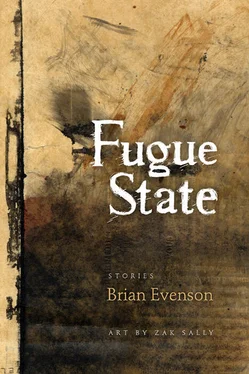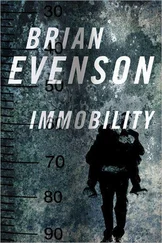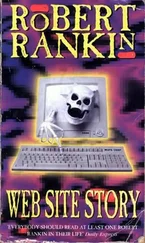And then Roeg acquired a panicked look. “Why are you speaking so quickly?” he asked. “Slow down.”
“I’m not speaking quickly,” Hapner said.
As Roeg tried to continue, it became clear to Hapner that something was wrong. Roeg became prone to long, reptilian fits of silence and would stop speaking to peer nervously around him.
“Roeg?” said Hapner. “Roeg?” But the small man wasn’t answering, wasn’t paying attention. Filled with doubt, Hapner asked, “That’s your name, no?”
“My name?” said Roeg, suspiciously. “Why do you want to know?”
And then Roeg groped his pistol off the couch cushion and began to jab it into the air. He pointed not at Hapner but at where Hapner had been a few moments before, for Hapner had stood and taken a few steps so as to get a closer look at Roeg.
“You had it?” Roeg shouted. “But why aren’t you dead?”
Roeg fired the pistol into the couch across from him. He moved the pistol a little to the left, fired into the credenza, left again, into the wall — just behind the spot Hapner had been just a few seconds before. Reaching out, Hapner wrenched the gun out of Roeg’s hand and dropped it to the floor. But it was as if Roeg didn’t realize the gun was gone, for his curled hand was still aiming, his finger flexing, over and over, and he was, desperately, asking Hapner why he wouldn’t die.
He spoke softly and carefully into Roeg’s ear, stroking and rubbing the small man’s hand until it loosened its grip on the absent gun. He persuaded him into lying down on the couch, then went into the kitchen and got a damp cloth, and carefully wiped away the blood already seeping up through the man’s eye sockets.
“How do you feel, Roeg?” he asked.
“Fine,” said Roeg. “I feel fine. Why do you ask?”
And indeed, thought Hapner, the fellow seemed to believe this, despite the blood.
“You shouldn’t feel bad,” said Hapner. “You might come out of it all right.”
“Come out of what?”
Blood began to leak from the man’s mouth and nose and ears. Slowly he lapsed into unconsciousness. Hapner was at a loss to know what else he could do.
He let his eyes drift about the room until they found the telephone, then the answering machine. He held the latter’s button down until it beeped, and then began to speak.
“Your name is Roeg,” he said into it. “You are a small man. This is your house. I’m very sorry for all that’s happened to you. My name is—” and there he stopped. What was his name again? Could he remember? No.
He turned off the answering machine and left the apartment.
V.
There was a name he had been using, just on the tip of his tongue. He could almost remember it. But, he wondered, was it his name? Even once he remembered it, how would he know for certain it belonged to him?
He wouldn’t know.
He made it to the end of the hall and started down the stairs to the next floor. What floor was it? He had kept track, had been keeping track, but was not quite certain. He would go down the stairs and then look for a door leading to the street. If there wasn’t one, he would try to find another set of stairs and go down them.
What had the name been? He had been found, had found himself, he could still trouble himself to dimly remember, lying beside a corpse. A woman, he was almost certain. Who, alive, had she been to him? His wife, his lover, a relative, a colleague, a stranger? Who could say?
Before he reached the bottom of the stairs, he could see a man in the hallway, first only his feet and then, with each step down, a subsequent portion of his body, all the way up to a shaved head. The man was standing beside a door, a large crowbar ending in a fanlike flange in one meaty hand. Leaning against the wall behind him was a sheet of plywood, apparently prized off the door. A large duffel bag, empty or nearly so, was swung over the man’s back. He had begun on the door itself, Hapner could see, the door’s frame splintered and gouged.
Hapner stopped a little way down the hall. The man too had stopped working and was watching him.
“Hello,” Hapner finally said.
“Hello,” the man said.
“What exactly—”
“—this your house?” asked the man. “Your door, I mean? I’m not stepping into a delicate situation, am I?”
Hapner shook his head. “No,” he said. “It’s not my door. Are you breaking in?”
“Some neighbor’s?” asked the thief. “Some friend’s then? Anything to get touchy about?”
Hapner shook his head.
“Any objections then? No? Then I’ll proceed.”
The man turned partly away, still trying to keep track of Hapner out of the corner of his eye, which made his attempts at opening the door awkward, blunted. But the door was slowly giving way.
“Aren’t you afraid?” asked Hapner.
“What?” said the thief. “Of catching it? Was at first but then everybody around me went under and I never did. I don’t think I will. What’s the word? Invulnerable?” He worked the flanged end of the prybar back in, and then one twist of his torso cracked the door open. “No,” he said, “immune. “ And then added, “After a while you feel invincible too.”
He pushed open the door, bights of a brass chain tightening at eye level inside the apartment. The man fed his crowbar into the gap, broke the chain’s latch off the doorframe.
“Well,” he said. “Coming?”
Hapner took a half-step forward, stopped.
“I don’t think so,” he said.
“Come on in,” said the man. “Where’s the problem? You didn’t have any objections last I checked. Besides, I haven’t had anyone to talk to for a while. They all keep dying on me. You’re not going to die on me, are you?” The man started through the door. “I’ll let you have some of whatever we find, maybe.”
Hapner hesitated, followed him in.
“What about you?” said the man in front of him.
The apartment inside was windowless and extremely dark; it was difficult to see anything. The man grew gray and then was reduced to a series of fluttering movements. Then he vanished entirely. Hapner stepped after him.
“What about me?” Hapner asked.
“Aren’t you afraid? You’re in a quarantined apartment now. Doesn’t it worry you?”
The man struck a match and Hapner saw his face spring from the darkness, in a kitchenette area. He was not where Hapner had thought he would be. He was holding the match in one hand, rapidly opening and closing cupboard and cabinet doors with the other.
The match guttered and went out and the room was swallowed in the darkness, save for the dull-red bead of the match head, and then this was gone too, replaced by the smell of the burnt-up match. A sharp scratch and another match fluttered alight. Hapner watched the man’s hand reach into a drawer, come out with a curious silver cylinder that he manipulated, transformed into a flashlight.
“That’s better,” the man said, and shined the flashlight’s beam into Hapner’s face.
“Now,” he said, his voice changing in a way Hapner didn’t understand. “What did you say your name was?”
“I didn’t say,” said Hapner. “What’s yours?”
“What’s that in the bag?” the man asked.
“My bag?” said Hapner. “Not much,” he said.
“Open it up,” said the thief. “Let’s have a look.”
Hapner put the bag on the counter between them, unzipped it. He took out the answering machine, set it beside the bag, then the short prybar, the hammer.
“That’s it?” asked the thief.
“That’s it,” said Hapner.
“You don’t have much,” said the thief.
“I’m not like you,” said Hapner. “I’m not a thief.”
Читать дальше












